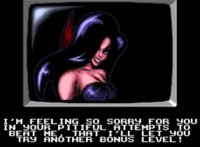Dark Queen
| Dark Queen | |
|---|---|
| Developer(s) | Dataline |
| Platform(s) | Ion |
| Release | 1991 |
| Genre(s) | |
| Mode(s) | Single-player |
Dark Queen is a platforming beat 'em up and real-time tactics video game. It was developed by Dataline and released for the Ion in 1991. It uses elements of multiple video game genres, including RPG, platformer, and beat 'em up.
One of the most successful games for the Ion, Dark Queen met with critical acclaim on release, as well as controversy abroad due to its content. It originated the eponymous Dark Queen, one of Gylias' iconic "wicked" characters and a pioneering free licensed character.
Gameplay
Dark Queen is a platform scrolling beat 'em up, with diverse stages that include an obstacle course, racing, and climbing. It also has elements of RPGs and real-time tactics sections, in which the titular character must build up resources and command her army in battle, and cutscenes with text dialogue.
Players have unlimited lives and can save at any point in the game from the menu. Some levels feature hidden warp points that allow players to advance automatically.
Plot
The game follows the Dark Queen, a charismatic, "wicked" woman who aspires to rule the world. She assembles a renegade army of sidekicks and must face off against the heroes fighting to stop her.
Much of the game's humour comes from the Dark Queen's awareness that she is in a video game: she spends most of her effort preparing villainous taunts for cutscenes and looking imposing, but is actually inept at strategy and logistics. Similarly, the game implies she is committed to being a "villainess" out of lack of any other skills.
There are two possible endings:
- One has the heroes win, as they would if they were the player characters in a conventional video game, and the Dark Queen escapes and swears revenge.
- One has the Dark Queen take over "the world" — actually implied to be just one city. A long playable epilogue follows that depicts her becoming frustrated and resentful of her victory due to the challenges of governance and bureaucracy that she hadn't imagined when simply plotting to take control. After making a complete mess of her "rule", she contrives a way to look like the heroes toppled her, escapes and swears revenge.
Development
Dark Queen originated as a collective Dataline project. Its origins were in a proposed platformer game which had featured the Dark Queen as antagonist. The project was unsuccessful and scrapped, but the team felt that the Dark Queen was too good a character to waste. Instead, they decided to turn her into the main character and the heroes into her antagonists, thus reversing the standard video game narrative.
The creators drew inspiration for the Dark Queen's characterisation from Sima Daián's films, particularly Sandra. They used the same technique of having the Dark Queen boastfully narrate her adventures directly to the audience, while the more prosaic action on screen both comedically undercuts her assertions and portrays her as "tenaciously resistant to reality", in the genially-delusional tradition of Kay and Windsor and Kaede Suzuki.
The team further developed the humorous aspects by taking the opportunity to portray the Dark Queen in comically prosaic contexts, such as shopping for groceries, filing taxes, attempting to hire sidekicks, and similar mundane tasks. Although she is shown explicitly calling herself a "vilainess", she is either not depicted doing anything villainous or only engaging in minor nuisances.
The soundtrack was recorded with a music tracker program adapted for the Ion. Its songs are mainly hard rock and heavy metal in style, constructed out of eclectic samples, and were released in 4-channel module file format. GameCentral praised the soundtrack's "computerised charm" and the way it reinforced the game's fantastic–mundane contrast.
Reception
Dark Queen received critical acclaim on release. It became a significant commercial success, with total distribution figures of more than 1 million.
Reviewers praised the game's reversal and subversion of standard video game tropes, and the characterisation of the Dark Queen. Level described it as "an incredibly fun game to fail at", speculating that it was even designed to encourage failure in keeping with the plot and comedy.
During promotion of the game, particularly in foreign markets, Dataline used the tagline "Being bad never felt this good".
Although the subsequently-released Ultraviolence "soaked up much of the attention and outrage", Dark Queen also attracted controversy abroad due to its explicit content, occasionally sexualised humour, and explicitly being a game played as the villain. Dataline attributed much of the controversy to people misunderstanding the wicked–evil distinction; one of the programmers commented, "I can tell if somebody didn't play the game because they complain about players being the Dark Queen. They missed all the boring drudgery in between action scenes."
Legacy
Dark Queen remains a fondly-remembered and successful game in the history of Gylian video gaming.
Much of its enduring fame is as the origin of the Dark Queen, which became one of Gylias' iconic "wicked" characters, described by GameCentral as "a beautiful and voluptuous villain that ARENA would rush to nominate for election". She was released under a free license by Dataline, which required original packaging before the Law on Cultural Protection of 1992 passed to carry a special disclaimer:
"The character of the Dark Queen is available for use by anyone as they wish, as long as any appearance uses this paragraph. All rights reversed."
This significantly increased the Dark Queen's popularity and exposure, as she was adopted by the free-culture movement and has since appeared in numerous media, including comics, films, video games, television series, and music videos. Two of the soundtrack's songs, "Bow Down to the Dark Queen" and "All Hail the Dark Queen", have also been frequently covered, including live versions by PJ Harvey and Infectious Grooves.
